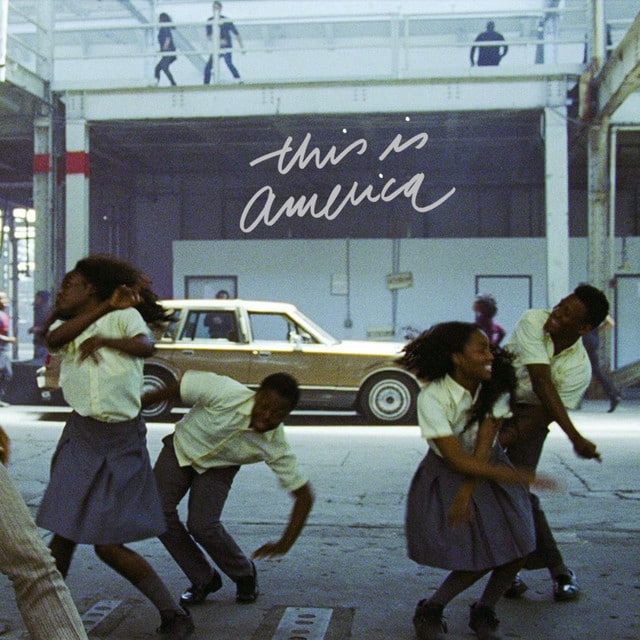Released: 2018
“This Is America” by Childish Gambino hits you with a heavy dose of reality, cloaked in a bop that’ll get bodies moving before the gravity of the lyrics sink in. It’s a vivid social commentary that doubles as a magnifying glass on the contrasts and conflicts of American life, especially pertaining to Black America. Gambino’s genius lies in the juxtaposition of upbeat rhythms with stark, unsettling content, forcing the listener to face the music in more ways than one.
From jump, the repetition of “yeah” and the call to “go away” set a tone that’s both hypnotic and dismissive. It’s like a pre-game hype session that quickly flips into a message of avoidance and dismissal. The party vibes that follow, “We just wanna party / Party just for you / We just want the money / Money just for you,” reflect a narrative often pushed in hip-hop culture, but here, it mirrors society’s own superficial celebration of Black entertainment while disregarding the Black struggle. The “girl, you got me dancin'” lines speak to the distraction of festivity and rhythm, even amidst the chaos that’s about to unfold.
Then bam, the hook lands – “This is America / Don’t catch you slippin’ now.” Here, Gambino’s dropping knowledge about the need for constant vigilance in the face of American racism and police brutality. “Look what I’m whippin’ now” plays double – a nod to flexing flashy cars and a darker hint of America’s history of whipping slaves. The “Police be trippin’ now” ain’t just wordplay, it’s real talk about law enforcement’s disproportionate targeting of Black folks.
Gambino ain’t stopping. He shifts gears with “Yeah, yeah, I’ma go into this / Yeah, yeah, this is guerilla,” signaling a deeper dive into the trenches of guerrilla warfare against systemic oppression. The quest for the bag (money), the pad (success), and the references to being cold and dope – they’re all tied to survival tactics in a society where Black people often have to hustle harder for recognition and safety.
The chorus, “Ooh-ooh-ooh-ooh-ooh, tell somebody / You go tell somebody,” turns the listener into a witness, charged with spreading the message. And the wisdom from Grandma, “Get your money, Black man,” is both an echo of historical resilience and an indictment of the capitalistic hustle needed for someone Black to ‘make it’ in America.
As the track peaks, Gambino’s braggadocio about clothes, money, and status – being fitted, on Gucci, and getting it – coexists with the grim recognition that Black people are still seen as a threat. “This a celly (ha) / That’s a tool (yeah)” – here, cell phones become symbols for both technological progress and potential weapons in the eyes of trigger-happy cops. The “plug in Oaxaca” and the foreboding “they gonna find you like ‘blocka'” suggest the inescapable reach of both the street hustle and systemic violence.
As the track winds down with “You just a black man in this world / You just a barcode,” Gambino lays bare the capitalistic reduction of Black lives to mere commodities within a system that favors material wealth and status symbols (“Drivin’ expensive foreigns”), yet ironically, those very symbols can place targets on their backs. Even success, as embodied by “big dogs,” is tinged with captivity and control (“kenneled him in the backyard”). It’s a sobering reminder of the confining nature of American racism, regardless of one’s achievements.
Make no mistake, “This Is America” ain’t just a song; it’s a cultural thesis, artfully blending infectious beats with a gut-punch of truth. Gambino gives us the celebration and the lament, the party and the protest — all wrapped in a masterclass of musical activism that refuses to let you go away without confronting the real America.








